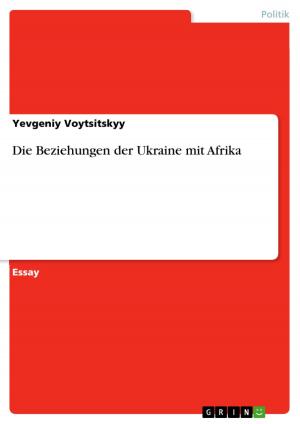Romani People in Brazil. From Exile to the Search for Social Rights
Nonfiction, Reference & Language, Law, Constitutional| Author: | Lívia Sudare | ISBN: | 9783668463653 |
| Publisher: | GRIN Verlag | Publication: | June 13, 2017 |
| Imprint: | GRIN Verlag | Language: | English |
| Author: | Lívia Sudare |
| ISBN: | 9783668463653 |
| Publisher: | GRIN Verlag |
| Publication: | June 13, 2017 |
| Imprint: | GRIN Verlag |
| Language: | English |
Bachelor Thesis from the year 2013 in the subject Law - Public Law / Constitutional Law / Basic Rights, grade: 10,0, , course: Law, language: English, abstract: The main goal of this study is to demonstrate the urgent need for a specific legislation to address the rights of the Romani People in Brazil, not only as a social inclusion guarantee but also as a form of historical repair. Therefore this work will analyze the little existent legal material on the matter and examine the Romani Protection Bill, proposed in 2011 and still under debate. This text is divided in three chapters in which are discussed social rights and their applicability through public policies and the public policies available to the Romani population, the history of their presence in the country and their current demands. The first Romani people to get to Brazil were forced here by law in the 16th century. Exiled from Portugal and Spain, they remained in a land that branded them as unwanted. The legal system determined it was a crime to be a Romani. The situation did not change through the centuries and it was only in the last part of the 20th century that Brazilian legislation began to pay attention to the State's duty towards them. An ethnic minority of almost one million inhabitants, the Romani are slowly coming out of the social invisibility they were thrown in by the hand of the State. In this research it is shown what has been done to change the reality of this social group in the country and what they would like to see done.
Bachelor Thesis from the year 2013 in the subject Law - Public Law / Constitutional Law / Basic Rights, grade: 10,0, , course: Law, language: English, abstract: The main goal of this study is to demonstrate the urgent need for a specific legislation to address the rights of the Romani People in Brazil, not only as a social inclusion guarantee but also as a form of historical repair. Therefore this work will analyze the little existent legal material on the matter and examine the Romani Protection Bill, proposed in 2011 and still under debate. This text is divided in three chapters in which are discussed social rights and their applicability through public policies and the public policies available to the Romani population, the history of their presence in the country and their current demands. The first Romani people to get to Brazil were forced here by law in the 16th century. Exiled from Portugal and Spain, they remained in a land that branded them as unwanted. The legal system determined it was a crime to be a Romani. The situation did not change through the centuries and it was only in the last part of the 20th century that Brazilian legislation began to pay attention to the State's duty towards them. An ethnic minority of almost one million inhabitants, the Romani are slowly coming out of the social invisibility they were thrown in by the hand of the State. In this research it is shown what has been done to change the reality of this social group in the country and what they would like to see done.















